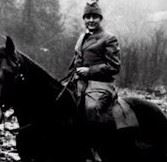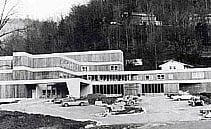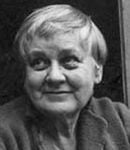 |
| Mary Breckinridge traveling by horse. (https://www.google.com/url?sa=i&rct=j&q=&esrc=s&so ()) |
Elbert Hubbard once wrote, "Down in their hearts, wise men know this truth: the only way to help yourself is to help others." The idea of helping people to help yourself can be expressed through Mary Breckinridge's life. Throughout Mary Breckinridge's life, she lost a lot of people that were close to her, so her outlet was nursing. Helping mothers to not go through what she went through was Mary's goal. Mary Breckinridge was an American Nurse-midwife and an organization founder of Frontier Nursing Center that attended the Rosemont-Dézaley School in Lausanne, Switzerland, from 1896 to 1898. She married Henry Ruffner Morrison, but he died of appendicitis in 1906. Then four years later, she graduated as a registered nurse. On Oct. 8, 1912, she married Richard Ryan Thompson, but it ended in divorce in 1918. Mary had a son in 1914, and then a daughter in 1916. Her daughter died within just six hours of her birth and her son died just after his fourth birthday on Jan. 23, 1918. A hero must go out of their comfort zone and do things ordinary people wouldn't do. They also must carry traits that an ordinary person wouldn't carry. For example, being respectful, trustworthy, caring, nice, ect. Mary Breckinridge was caring and did things an ordinary person wouldn't do, which, therefore, she is a hero.
 |
| https://www.google.com/url?sa=i&rct=j&q=&esrc=s&so () |
Mary Breckinridge cares about people that are sick or dying and makes an effort to help them. After Mary founded Frontier Nursing Center (FNS), Laura Ettinger wrote, "Breckinridge designed FNS to serve mothers and families in districts surrounding a central hospital in Hyden, Kentucky." (Ettinger, Laura). Mary designed FNS to care for mothers that had a child or children that had a health condition or that were sick. Mary's goal was to make sure the number of child deaths were decreasing. She also didn't want any other mother to go through what she felt like to lose of their children. She went to Leslie County in Kentucky, a place that was neglected and not taken care of, and started to use her new nurse education to help the people staying there. After Mary started nursing, she once said, "Raise the status of childhood everywhere." (Drew Faust). After losing both of her children, Mary decided devote the rest of her life to helping other mothers going through similar things. She volunteered at many different nursing centers, such as the American Red Cross in France, a public health nurse in Boston and Washington, D.C, and she put together a disaster relief in Vic-sur-Aisne. The Encyclopedia of World Biography, entitled "Mary Breckinridge", states that Mary wanted to help out one of the poorest places in the US, Kentucky. "Breckinridge chose to situate her community nursing service in Leslie County, Kentucky, deep in the heart of the state's Cumberland Mountains. Leslie and its surrounding environs were one of the remotest, and poorest, regions in the United States." (Mary Breckinridge). After her children died, she didn't have anything to do, so instead of grieving and living in the past, Mary wanted to help the people of Kentucky. She became a nurse because she wanted to do something to take her mind off the loses, but help people at the same time. She also helped counsel families that were going through a tough loss. An ordinary person wouldn't go through the troubles of making their own nursing center in a poor community and try to help people.
Mary Breckinridge steps up to do things others wouldn't do by creating FNS and traveling across the ocean to help people in need, which makes her a hero. Mary didn't give up being a nurse-midwife, even though there weren't any in the US, so Ettinger wrote, "Since nurse-midwives did not exist in the United States, her service employed mostly British public-health nurses, who also were trained as midwives. First by horseback and later by jeep, FNS nurse-midwives traveled through the mountains to offer prenatal, labor and delivery, and postnatal services for women, as well as public health programs for men, women, and children. Although FNS hired a medical director in the early 1930s, the nurse-midwives handled nearly all deliveries at patients' homes without medical assistance." (Ettinger, Laura). Mary mostly worked in Britain because Nurse-midwives didn't exist in the US, but around 1924, she moved to Kentucky and founded FNS. Mary hired nurse-midwives that had worked with her in Britain, to work at FNS. They labeled herself as a nurse-wives, which nobody else in the US had done. (Ettinger, Laura). After Mary did nursing practice and volunteering in Britain, she came back to the US because her main goal was to help the poor communities in America, so Drew Faust wrote, "Logical responses to the needs of the young child in rural America." (Drew Faust). After her work in France and England, Mary came back to the US and decided to bring her new finding into areas that had been neglected and nobody thought about. Mary went to Leslie County in Kentucky to help people who might not have gotten proper health care or couldn't afford it. To Mary, the challenge of bringing services to such an isolated area, made her feel good about herself. (Drew Faust). The Encyclopedia of World Biography, entitled "Mary Breckinridge" wrote that Mary traveled all the way to France, just to work for the American Red Cross. "Breckinridge signed up to work for the American Red Cross in France with the newly created American Committee for Devastated France, known by its French-language acronym CARD." (Mary Breckinridge). Mary sailed across the ocean just to work as a nurse-wife, which traveling far distances was not common back then. She was so passionate about being a nurse-midwife and helping others, she journeyed across the ocean. (Mary Breckinridge). A normal nurse wouldn't travel all the way to France to get extra nursing practice or open up their own nursing center to help people in need, but Mary was different.
 |
| Mary Breckinridge (https://www.google.com/url?sa=i&rct=j&q=&esrc=s&so ()) |
Mary nurtured many people and stepped up to do things that the ordinary person wouldn't do. Throughout Mary's life she inspired many people to help and care for others. She cared for people in need; which made families feel good that someone was taking care and helping their child. She also gave poor people that couldn't afford medical care, a chance at getting proper care when she created FNS. "The FNS service became part of the Kentucky Medicaid and Women, Infants, & Children (WIC) programs. Ten years after Breckinridge's death, New York Times reporter James T. Wooten visited Hyden for the dedication of a new $2.7 million Mary Breckinridge Hospital." (Mary Breckinridge) Mary inspired the people of Kentucky to continue working at the hospital after she died. They continued to nurse people just like Mary did, so they later named a hospital after her since she loved helping and caring for people. Mary's family life was difficult, but she persevered and wanted good to come from what she had been through. She inspired other mothers not to give up even if one of their children had passed. "Once again Mary Breckinridge turned to nursing as an outlet for her sorrow..." (Drew Faust). Even after her husband and two children died, and after she divorced with her second husband, Mary didn't give up. She decided to start helping other people going through similar children problems. She inspired other mothers not to give up even if one of their children had passed. (Drew Faust). Mary showed that even though she lost lots of the things she loved, it's possible to come back and do something great with your life.
WORKS CITED Drew Faust. BRECKINRIDGE, Mary. EBSCO Industries, web.a.ebscohost.com/brc/detail?sid=ac7f2ae6-7233-4b7e-a7bd-e3d6747b58af%40sessionmgr4006&vid=5&hid=4206&bdata=JnNpdG YnJjLWxpdmU%3d#AN=34645494&db=b6h. Accessed 2017. Ettinger, Laura. Mary Breckinridge. EBSCO Industries, web.a.ebscohost.com/brc/detail?sid=ac7f2ae6-7233-4b7e-a7bd-e3d6747b58af%40sessionmgr4006&vid=3&hid=4206&bdata=JnNpdG YnJjLWxpdmU%3d#AN=35190532&db=b6h. Accessed 2017. "Mary Breckinridge." Encyclopedia of World Biography, vol. 31, Gale, 2011. Biography in Context, link.galegroup.com/apps/doc/K1631009525/BIC1?u=powa9245&xid=40bdb5f3. Accessed 4 May 2017. "MARY ON HORSEBACK." Publishers Weekly, 14 Sept. 1998, p. 70. Gale Biography In Context, go.galegroup.com/ps/i.do?p=GPS&sw=w&u=powa9245&v=2.1&id=GALE%7CA21144964&it=r&asid=aa33d329481907efa860a04835 dbe83. Accessed 4 May 2017
Page created on 5/22/2017 12:00:00 AM
Last edited 5/22/2017 12:00:00 AM
